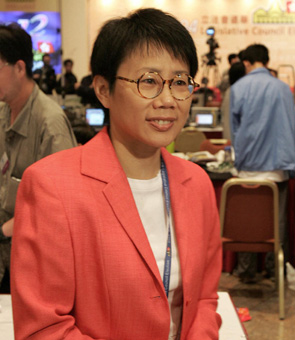
You can get a fair idea of what Christine Loh is like from the office of Civic Exchange, the nonprofit, Hong Kong-based think tank she founded in 2000. Expressionist originals adorn the walls. Lighting levels are conservative and the air-conditioning is set at an ecologically sensible level. Their carbon emissions exemplarily reduced, half a dozen people work in grave silence, save for keystrokes and subdued phone calls. Out of this industrious pool, with no executive chair or partition to distinguish her from her colleagues, Loh, 51, rises to offer greetings. The prime mover of Hong Kong's environmental community is laudably bright of eye, considering she has just stepped off a plane from London, where she attended a meeting of the C40 Cities Climate Leadership Group — an organization set up to promote best-practice environmental management in the world's largest urban centers.
In her twenties, Hong Kong-born Loh was already constantly crisscrossing the skies, pursuing deals as the regional managing director of a U.S. commodities trading firm. But from her business-class gondola at 35,000 ft., she gazed down upon an increasingly wounded world. "I was reading the newsmagazines one would find on airplanes," she recalls, "and there was a spate of major articles on ozone depletion, and a couple of articles on global warming and deforestation. I remember thinking that if only half of this was right then we were in deep trouble." A subsequent stint as chairman of the Hong Kong branch of Friends of the Earth failed to satiate Loh's drive to improve things. So, in 1992, she jettisoned her commercial career to enter politics for several years, becoming a forceful liberal voice in Hong Kong's oligarchic legislature and notching up a major environmental victory in a landmark 1997 ordinance to protect Hong Kong Harbor.
Today, as an international adviser to the G8+5 Climate Change Dialogue, and a director of the Association for Sustainable and Responsible Investment in Asia, her remit is wider and her office produces a torrent of papers, books, articles and speeches on environmental issues. In southern China — the most economically advanced region of the most populous nation on earth — there is no one like her. She is the go-to person for big-picture environmental thinking and policy suggestions, informed as much by a searching intellect as by her experience in finance or frontline politics. She has succeeded in pushing the environment to the forefront of public debate, overcoming a bureaucratic and cultural ethos that sees anything other than unbridled consumption and development as somehow anti-social. All of this makes her an agitator in the best sense of the word. "I started to ask why things were the way they were when I was in my early twenties," says Loh. "Once you start asking that, it can be an incredibly dangerous question."